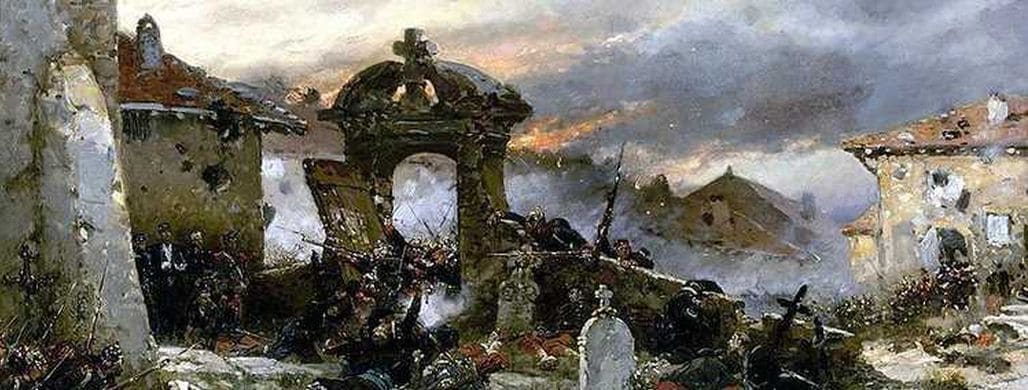
[Europe and America, 1870/71] After his failure in Mexico, Emperor Louis Napoleon Bonaparte in France needed a success in his foreign policy. The much aggrandized Prussia and Bismarck annoyed him.
Moreover, he held grudges against Bismarck since the latter had denied “compensations” for France’s neutrality in the Prussian-Austrian war.
Sedan
In July 1870 it came to a diplomatic crisis between France and Prussia, and France declared war. Not only in Prussia, but also throughout Germany patriotism overruled all other feelings. The Prussian Minister of War ordered universal conscription, and also Emil had to leave for the front. In early August, Prussian troops, supported by Bavaria and other German States, invaded France. Soon they had the French main army trapped in Metz, and defeated a relief force at Sedan. Almost the whole army and Emperor Napoleon III were taken prisoners. In France, the republic was proclaimed and a people’s war against the enemy troops began. Only at the end of January Paris capitulated. In May, peace was made in Frankfurt, but it was very hard on France.
Germany united
After the victory of Sedan 1870, even the reluctant German states gave in to the patriotic enthusiasm. Now Bismarck could win them over for unification. The Bavarian King Louis II, being the most prestigious among the German princes, offered the Emperor’s crown to King William I of Prussia. Rumor has it that Bismarck pushed him. William was proclaimed German Emperor on January 18, 1871, in the Hall of Mirrors at Versailles.
“Are you happy now, Lorenz?” His friends and neighbors asked. “Yes, I am happy with all my heart that the old homeland is finally united,” he replied. “And yet there are things that bother me, that I wish would have been done in another way. Was it wise to proclaim the Empire in Hall of Mirrors at Versailles? Did the conditions on France have to be so hard? France has to pay 5 billion francs reparations and cede Alsace-Lorraine, and no one asked the people there. That will only fuel hatred.”
The Civil War had been too hard on the USA and the Bergmann family for Lorenz not to feel for the defeated. Guests often told him how much they liked Niklas’ drawings on the walls, his beautiful wine list and Jenny dishes. That pleased him, but at the same time the feeling of loss tore into his heart like a dagger. Moreover, he had not heard from his family at the Rhine yet.
Baby girl Susan
Then he received a letter from Germany. Emil had returned sound and safe from the war and could now live with Lena in piece, but not in quietness. “Lena and I have a baby,” he wrote, “it’s a little girl with very dark eyes, and we have named her Susan!”
That was more than enough reason for a merry family celebration, and after all those years of hardships and privation, they again had “Mountain Man’s Bliss”. Lorenz’ brother-in-law Joseph approached him. “You would love to see little Susan, don’t you?” he asked, “and you would love to see your homeland at Rhine again. There is no need to feel guilty about it, we are doing good business, and we owe that very much to Emil and Lena. Go and see them!”

Be the first to comment